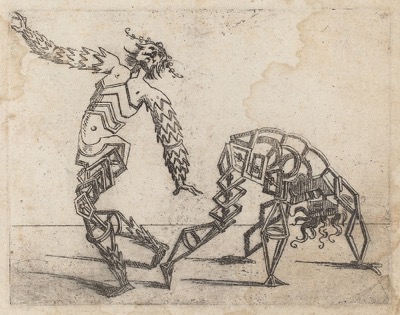Mouving

Giovanni Battista Bracelli: Bizzarie di Varie Figure (1624)
" … never more present than just after leaving."
We claim to move in, through, under, and on, but I suspect that we don't, not really, not nearly. Our apparent motion misleads both eye and understanding, for our momentum isn't as smooth and separate as it superficially seems, but sticky. We need nudges. We leave traces—of both our presences and our passings—much more permanent than contrails dissipating upon appearance. I think of myself as Mouving around with the sort of motion requiring a little shoving and a little mourning to get started, some elbowing to proceed, and considerable sloughing off along the way. I leave much behind me and unwittingly (inevitably?) carry much forward. I remain where I was, perhaps forever, and wherever I relocate holds traces from wherever I came. I seem to smear from there to here and onto my next appearance. I imagine myself moving through walls sometimes, and have even succeeded, but only when I accepted the irreparable damage my moving through them inflicted, to both the wall and myself. My lapels tended to be permanently dusted from those antics.
When The Muse and I were still consulting, we'd often encounter those we labeled The Complainants. Many of them had been sentenced by some superior—for "their own good"—to work with us, and most held at least a little grudge at the forced inconvenience. Nothing stifles motivation like being conscripted into the pursuit of another's good. Complainants could become self-destructive distractions in a classroom so we would invite them to betray their boss' intentions by finding something they personally wanted within the experience, to pursue something they preferred instead of whatever they'd been encouraged to want. A small conspiracy would emerge, though we promised to never disclose it, then we set about to affect real change by refusing to inflict it. Some would not be convinced and nurtured their grudges. Some grew so frustrated with their company that they resigned and moved elsewhere. The stories we heard later reported that the new position turned out to include the same impositions the old one had. Some moved on several times without ever noticing an emerging pattern.
From the moment we declared that we were HeadingHomeward, barriers to exiting appeared. Small things, mostly, but seemingly increasingly weighty ones, resulting in a stack of inconveniences high and wide enough to set us questioning our decision. We hold as a given the reassuring belief that the most important things happen at the least convenient times, and this belief helps us cope by reassuring us that we suffer from little more than perhaps a severe case of The Normals. Of course our egress seems sticky. 'Twas always thus and could be no other way. Each imagined delay, confirmation that we're stickier, nothing even remotely like Teflon® here. Some parts of us will very likely never leave. We'll just as likely find that we've tracked in some of here when we cross over the next new floor. We're everywhere at once.
We persist in spite of these insults, perhaps ultimately because of them. There might be no better way to encourage forward momentum than to try to inhibit it. Those whose freedom has been forcefully denied become the greatest champions of freedom. Those who move on hold fonder memories of a place than those who stayed behind. No clean beginnings or endings, we become the sum of our own detritus. Mouving in, through, under, and on in name only. No exit, no entryway, either. We seem to be everywhere at once and perhaps never more present than just after leaving.
©2021 by David A. Schmaltz - all rights reserved


